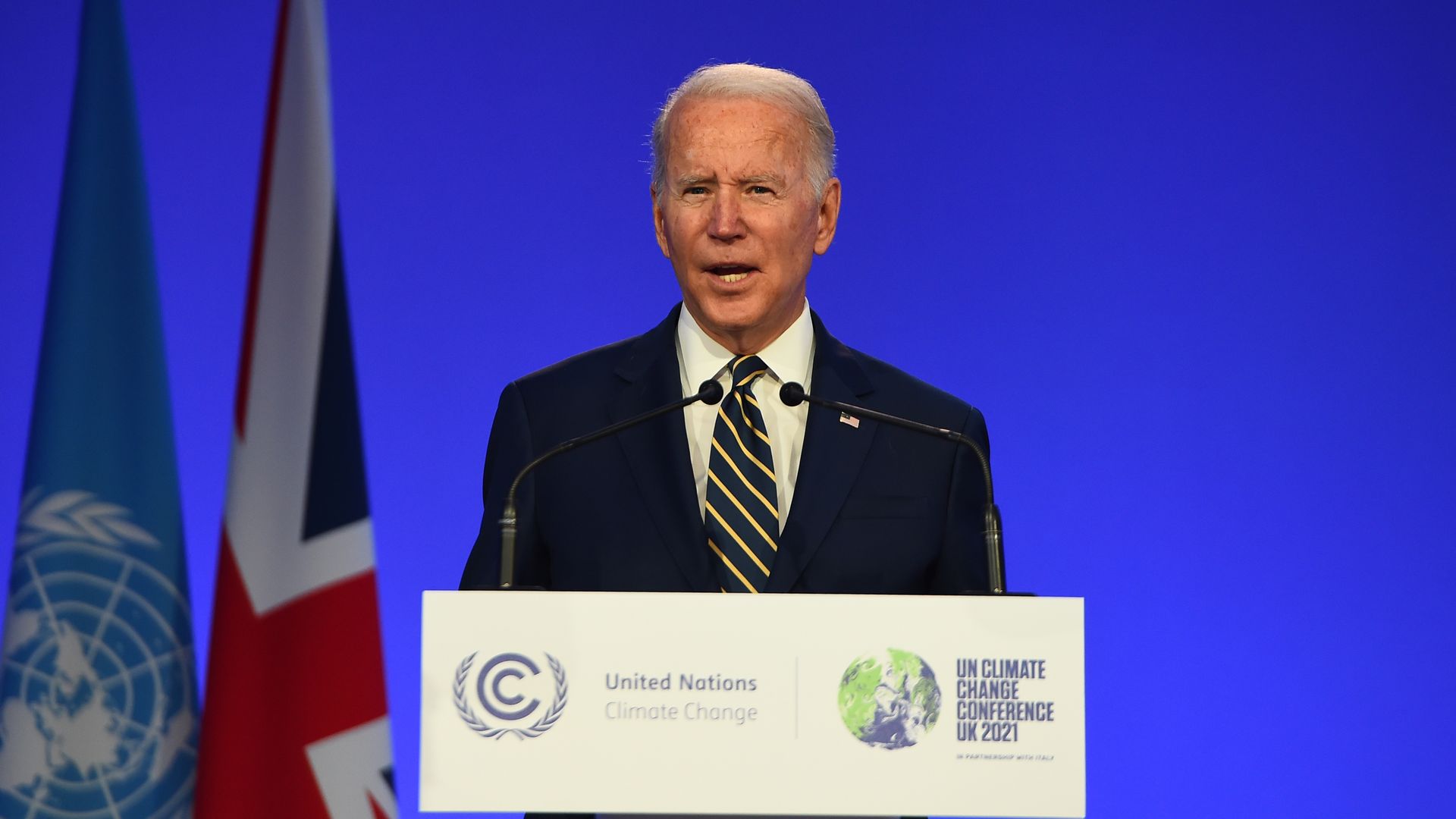
Joe Biden speaks at COP26 on Nov. 1. Photo: Andy Buchanan - Pool/Getty Images
More than 100 world leaders — as well as thousands of diplomats and business leaders — converged on Glasgow, Scotland, on Oct. 31 to try to set new emissions reduction goals at the COP26 climate summit.
The latest: President Biden on Tuesday said that China made a "big mistake" by not showing up to the UN climate summit, adding that Beijing has "lost an ability to influence" other countries as a result.
- 105 world leaders on Tuesday signed onto the Global Methane Pledge, a U.S. and EU joint initiative, to cut methane emissions by 30% by 2030
- Several public and private entities on Tuesday committed billions directed toward conservation and renewable energy.
What they're saying: In his remarks on Monday, President Biden warned that "every day we delay" strong action on climate change, "the cost of inaction increases" and urged the world to help developing nations "so they can be our partners in this effort."
- Biden also apologized for former President Trump's decision to withdraw the U.S. from the Paris climate accord.
- United Nations Secretary-General António Guterres on Monday pleaded for more aggressive steps to curb climate change during his opening remarks, signaling his concern that COP26 won't lay the groundwork to put global emissions on a sustainable path.
Why it matters: It's an annual meeting, but this year's assembly is viewed as crucial, since climate scientists warn that time is running out to secure necessary greenhouse gas emissions cuts to avoid potentially devastating climate change impacts during the next several decades.
- Alok Sharma, president of COP26, attempted to temper expectations before the start of the meeting, saying it will be "in many ways harder" than COP21, the meeting that established the 2015 Paris Agreement.
The big picture: As host of the meeting, the U.K. is seeking to secure enough new emissions reduction pledges in order to keep viable the goal contained in the Paris Agreement of limiting global warming to 1.5°C above pre-industrial levels by 2100.
- Keeping global temperatures below that target would substantially reduce the impacts of climate change, but meeting it would require a massive shift from current trends in carbon dioxide emissions.
- Based on current emissions trends, the International Energy Agency recently found that temperatures would reach 2.6°C (4.7°F) above preindustrial levels by 2100 and keep rising.
- The summit, which runs until Nov. 12 (though these gatherings often run into overtime), also is aimed at rallying financial support for developing nations to better withstand the impacts of global warming.
- Industrialized nations, represented by Canada and Germany, unveiled a $100 billion climate finance plan for developing countries in late October.
Yes, but: COP26 will have to brave staggering headwinds to produce tangible, achievable plans to keep global warming in check.
- The world has run headlong into an energy crisis before the conference, which could make the world's top emitters and users of coal — such as China and India — reluctant to commit to more substantial pledges, such as phasing out coal-fired power plants.
- Heightened tensions between the U.S. and China may also complicate the talks, potentially hindering the global cooperation needed to prevent drastic climate change.
- And Congress has yet to pass any significant climate legislation, putting President Joe Biden in a weaker position than he had hoped.
- The UN said in a new analysis released on Oct. 25 that global warming would remain unchecked even if current formal targets submitted under the Paris agreement are implemented, essentially concluding that more aggressive emissions cuts are required.
Who's attending?
- President Biden joined Canada's Prime Minister Justin Trudeau, French President Emmanuel Macron, Germany Chancellor Angela Merkel and U.K. Prime Minister Boris Johnson, the host of the conference, for the opening sessions of the conference on Nov. 1.
- Indian Prime Minister Narendra Modi also attended the opening in person.
- Russian President Vladimir Putin did not attend the talks but will take part remotely.
- Chinese President Xi Jinping also did not make a physical appearance. He hasn't traveled internationally for more than 600 days — the longest streak of any G20 leader.
- Pope Francis intended to travel but bowed out earlier this month for unspecified reasons.
Key countries:
- China: The world's largest emitter of greenhouse gases — is in the midst of a deepening energy crisis, with skyrocketing coal costs, that has contributed to slowed economic growth. On Thursday, China came out against a net zero emissions by 2050 target.
- U.S.: Though the Biden administration, through John Kerry, Biden's climate envoy, has spent months spurring on new climate pledges from other countries, Biden showed up to the summit without congressionally-enacted legislation — an absence that could be exploited by other nations as reasons to doubt America's resolve on this issue.
- Biden during the opening session urged the world to use COP26 to "answer history's call" and create an environment that raises the standard of living around the world while preventing climate change.
- India: Like China, India's rising energy prices and reliance on coal may make it hard-pressed to make new major commitments, though David Waskow, director of the World Resources Institute's International Climate Initiative, told Axios' Andrew Freedman that India is expected to unveil a new goal of some sort.
- India in late October dismissed calls to set a net-zero carbon emissions target for some time in the future, saying such goals were not the solution to the climate crisis.
- Russia: Despite passing on an in-person appearance at COP26, Putin said earlier this month Russia was ready for dialogue to seek ways to tackle climate change and that it would strive to be carbon neutral no later than 2060.
- Russia, a top exporter of fossil fuels, has been accused of dragging its feet on policies to curb climate change, according to the New York Times.
Go deeper:
